General Metal and Holloware
 |
John Shaw & Sons
(Wolverhampton) Ltd.
Fourth Avenue, Bushbury |
 |
The City archives contains a cache of documents relating to this firm (call
no: DB24). This is one of the most important business archives in the city's
collection and would be suitable material for anyone who wishes to carry our
a project on this large Wolverhampton concern. In the meantime, I have made
these notes to accompany the exhibits. They come from various sources,
including the outline history of the firm which appears with the archive's
handlist and which was, presumably, prepared by the archivist who made the
handlist. My account may be subject to much correction and addition,
especially if someone does a proper job examining the DB24 archive..
The note above appeared when these pages first appeared on
this web site, many a long moon ago. Now (January 2009) I have
belatedly caught up with the fact that someone is working on this archive of
the firm. This highly commendable work is being done by Andrew Popp, now of
Liverpool University. He has already published some results:
"Building the Market: John Shaw of Wolverhampton and Commercial
Travelling in Early Nineteenth Century England", Andrew Popp, Business
History, Vol.49, No.3, May 2007, 321-347. So far as I can tell this is
a valuable contribution to business history, especially the role of the
factor and the commercial traveller; but I can be quie sure that this
is a fascinating addition to Wolverhampton's local history. I have
made some amendments to the following pages in the light of this article;
but I await the publication of further article by Andrew Popp, including
maybe a book about John Shaw, with eager anticipation.
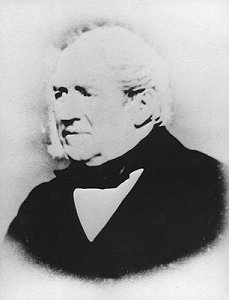 |
John Shaw (shown in the photo to the left, thanks to
Alex Chatwin) was born in 1782, apparently in Penn. It know
when or where he set up in business but his company later always claimed
to have been established in 1795. It is just possible that he
started in business at the age of 13 if, for example, he had started
work at that age by making his own lines at his father's forge.
The first hard evidence is a stock book in the city archives, dated
1805. He travelled the country on horseback, selling his wares. In
those days it was quite common for the senior member of a firm to do his
own selling. In due course his son became their salesman and was joined
by other non-family members. It now seems that, in the first half
of the 19th century at least, the firm acted solely as factors and did
not make anything themselves. |
On one of these trips, in the period 1811-13, he met his
future wife, Elizabeth Wilkinson, in Rochdale.
They had at least four children:
John Shaw, 1816 - 1839
Thomas Wilkinson Shaw, 1820 - 1887
Edward Dethick Shaw, 1822 - 1886
Richard Edwards Shaw, 1826 - 1898
The eldest son, John, died on a business trip to India. The memorial
to him, on his parents' tomb, records that he died at Simla. He would
have been in Simla either because the Indian government was there on its
annual retreat to the hills or because he had gone there when he was
taken ill on the plains.
However, his presence there shows that the business was extending in
all directions. |
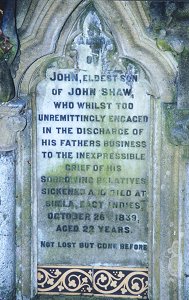 |
Shaw apparently operated from premises in George Street.
In 1815 he went into partnership with one Henry Crane, and the firm was
known as Shaw and Crane. This partnership lasted until 1848 when it
split up, Shaw continuing in George Street and Crane setting up on his own
account in Darlington Street. The firm was now called John
Shaw and Sons.
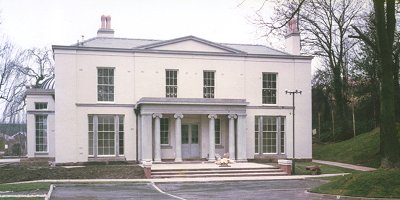 |
The success of the business is evidenced by the fact
that, in the 1830s, Shaw was able to buy Oxley House, a mansion on the
Stafford Road. By the middle of the century the company is said to
have had a turnover of half a million pounds a year, an enormous sum for
those days. |
Around 1852 he acquired premises at 64 Church Lane, where
it appears that he was actually manufacturing pots, pans and coffin plates, and probably other
things, as well as continuing to act as a factor. If he had indeed
become a manufacturer, it would be interesting to speculate on why he took
this step.
| John Shaw became active in local affairs. He was a
prominent member of the Queen Street Congregational Church, (which, it
might be significant to remember, was a church largely attended by the
working classes); a founder of the Wolverhampton Library; and his is one
of the names which appears on the petition for incorporation of the town
in 1848; he was also a magistrate. |
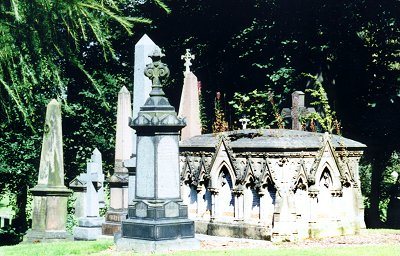 |
 |
John Shaw died on 15th August, 1858 and was
buried in Merridale Cemetery in a tomb of some magnificence. It is
the gothic chest tomb shown on the right of the photo above. (The choice
of Gothic may be a bit odd. It was not a very common style for
tombs and non-conformists generally associated it with the Church of
England and preferred something more classical in feeling). His three
remaining sons continued his example of expanding the family firm and
being community leaders in the Congregational interest.
It seems that T. D. Shaw and E. D. Shaw concentrated on the family
business whilst R. E. Shaw, the youngest brother, gave most of his time
to the church. |
May's history of the Queen Street Congregational Church
gives them a good deal of space.
|
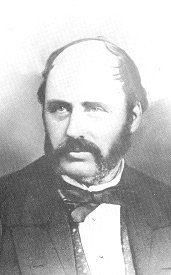
Thomas W. Shaw. |
"Mr. T. W. Shaw and Mr. E. D. Shaw were merchants
greatly respected in the town, who carried on the well-known business of
John Shaw & Sons, in Church Lane. They were wealthy men, and generous
supporters of the church and its institutions, and also of the charities
of the town. They together subscribed one-third of the entire cost of
the new chapel. Mr. T. W. Shaw was for a time a superintendent, and
Mr. E. D. Shaw a teacher, in the Sunday school, and each of them lent
his support and counsel to the minister and his work at Queen Street.
Mr. T. W. Shaw was the first chairman of the directors of Tettenhall
College.
Mr. R. E. Shaw, while not taking so commanding a position in the
business of the town, took a more prominent part in the work of the
church than his brothers. |
|
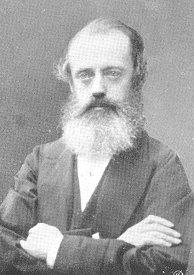 Edward D. Shaw
Edward D. Shaw |
He was of a quiet and retiring nature, and a tireless,
patient, and scrupulously conscientious Christian worker. Like Mr. S. S.
Mander, he was for many years a second pastor to the church. For the
greater part of his life, he was the teacher of the senior male class in
the Sunday school, and many young men owed their bent in life to contact
with his truly Christian personality. It was his custom for years every
Sunday, at the close of his afternoon class, to take two or three of the
young men home with him to tea, and he sought in closer intimacy to make
friends of them and to bind them to Christian ways. For forty-four
years he was a member of the church, and served it as secretary and
deacon. He was also for many years treasurer of the Sunday school, and
the honoured and beloved lay-superintendent of Heath Town branch church. The three brothers died during the pastorate of Dr. Berry, leaving
gaps most difficult to fill. |
|
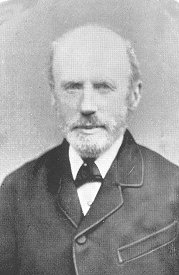 Richard E. Shaw.
Richard E. Shaw. |
A marble tablet in the chapel, erected by their Queen
Street Congregational Church fellow-members, commemorates two of the
brothers. The inscription is as follows:
"Erected by this Church in memory of Two brothers, Thomas Wilkinson
Shaw, Died January, 1887, aged 67 years, and Edward Dethick Shaw,
Died February, 1886, aged 64 years, Members of this Church. One in
service. United in life eternal."
In memory of Mr. R. E. Shaw, the church has affixed a bronze tablet
to the wall of the chapel, near the seat usually occupied by him, and
inscribed thereon are the following words: |
"To the glory of God. In grateful and affectionate remembrance of
Richard Edwards Shaw, who was for forty-four years, a beloved member of
this Church, filling many of its offices with rare fidelity, and
adorning them with unobtrusive grace and piety, who fell asleep in Jesus
July 12th, 1898, aged 72 years. Large was his bounty, and his
soul sincere. This Church owes much to his patient labour as a deacon
and secretary through many years. The branch Church at Heath Town is a
perpetual memorial of his wisdom and zeal. The Sunday School honours him
as one of its oldest and most effective teachers. Through a life of
varying fortune he ever placed first things first, giving to God’s
service the most and best of a noble life. This memorial is the loving
tribute of his fellow-members in this Church, who give God thanks in his
behalf, and who pray that the fruit of his faith and work may multiply
through those to whom he gave instruction and bequeathed example. In
Christ he lived; in Christ he died; in Christ he lives evermore."
The new chapel, to which the brother subscribed one-third of the cost, is
the Queen Street Congregational Church. (Samuel Mander was another very
large subscriber). T. W. Shaw had laid the foundation stone (and, having
done so, he jumped up on to it and delivered a lengthy address, despite the
"slight showers" which fell. The reference to R. E. Shaw’s "life of varying
fortune" is unexplained.
T. W. Shaw and E. D. Shaw were also amongst those who set up Tettenhall
College, the main purpose of which was to provide a non-conformist education
in the style of the Church of England public schools that were then
beginning to thrive. In 1862 T. W. Shaw became the first Chairman of the
Midland Counties Proprietary Company (the joint stock company the founders
had chosen at the business-like vehicle for their school) and E. D. Shaw was
another founder. Geoffrey Hancock refers to them both as "merchants and
bankers".
Jones' history also records of T. W. Shaw that "for about a quarter of a
century he was Chairman of the Wolverhampton and Staffordshire Banking Co.,
being highly respected for his integrity and business ability." Exactly what
that business ability was, we do not know and it is impossible to say what
the company's great expansion was based on. Hard work, obviously. But what
else? Was it good salesmanship, better production methods, better design?
When Edward and Thomas Shaw both died the firm was converted into two
limited liability companies. The one, T. E. Thompson & Co. Ltd., took
over the firm's representation in India and the far east. Thompson was
one of the firms commercial travellers in this country and had been sent to
India to set up an "indent" business there - taking orders locally and
sending them back to England to be fulfilled direct. The other,
John Shaw and Sons (Wolverhampton) Ltd. took over the UK end of the
business.
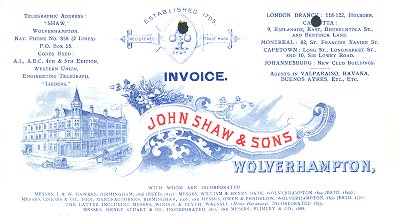 |
This invoice heading, dating from 1910, provides us with
some interesting information about the company. |
| It shows a drawing of what must be their
building. It is the building now known as Amar House, which stands on
the corner of Broad Street and Fryer Street, with the main entrance, in
Fryer Street, sporting the best Victorian tiled hall and staircase
in Wolverhampton. Whether or not Shaw's built this building is not
known but it would obviously have provided offices and show room space. |
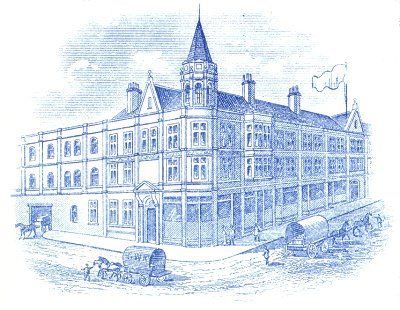 |
Possibly, to judge from the horse and wagon emerging
from the more prosaic part of the building, warehousing or even
manufacturing space. But the windows along Broad Street, of what would
probably have been the showrooms, are not full of goods, but blanked off,
suggesting at least some change of plan from the original designer's
intentions. The date of the building is unknown but the Archives
suggest that Shaw's moved there in 1899.
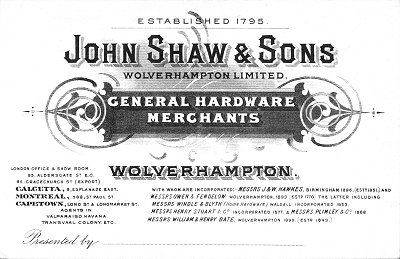 |
This business card dates from the turn
of the century. It and the invoice heading reflect the scope of
the company's operations in that they mention not only a London branch
in Holborn, but branches in Montreal, Cape Town, Johannesburg and
Calcutta. There are also agents in "Valparaiso, Havana, Buenos Ayres,
Transvaal Colony, etc.". |
It is clear that by this time Shaw's was not just a
factor selling other people's goods, but was firmly into manufacturing as
well. But part of the explanation for their
expansion also seems to lie in take-overs, for the invoice heading gives a
long list of the firms who are incorporated in Shaw's, together with, in
most cases, the dates of their foundation and the dates of their
incorporation:
J. & W. Hawkes, Birmingham, established 1831, incorporated 1896
William and Henry Bate, Wolverhampton, 1849, 1899
Onions & Co, Birmingham, 1906
Owen & Fendelow, Wolverhampton, 1770, 1899
Owen & Fendelow are mentioned as themselves incorporating:
Windle & Blyth, Walsall, 1853
Henry Stuart & Co, 1877
Plimley & Co, 1888
In 1919 the firm became a public company.
The next source I have is a "Catalogue of Tools for All Trades", issued
by John Shaw & Sons, Wolverhampton, Ltd., in 1939.
| The first thing to note about this catalogue is its back
cover, which shows an artist's impression of what is described as "Six
acres of Manufacturing and Distributing Efficiency" and referred to as
"the new home of John Shaw & Sons Wolverhampton Ltd and associated
companies".
Their address is "Fourth Avenue, Bushbury". |
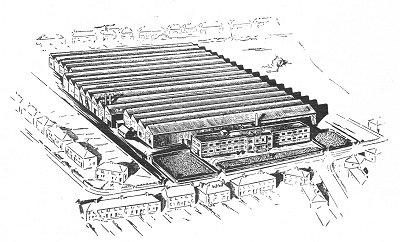 |
The premises are clearly those built for Clyno cars and
opened by them in January 1928 and closed again, on the company's
liquidation, in 1929. Shortly after that, advertisements, showing the
works empty and stripped of machinery, advertise the property for sale. The
advertiser is Alfred Herbert of Coventry, who are machine tool makers, not
estate agents. Presumably they had bought the premises and contents from the
liquidators, stripped out the machinery and were trying to sell off the
land. It may have hung around their necks for some while if Shaw's are still
describing it as their new home in 1939.
The Archives suggest that the move had been made "by 1937". They
also record that they took with them to the new premises Jenks Brothers Ltd.
and the British Tool and Engineering Co. Ltd., (Britool) who had both been
taken over by Shaw's in that year, 1937, Jenks Brothers Ltd. being the
parent company of Britool.
It seems that Jenks Brothers rented one half bay at the works and Britool
rented nine and a half bays.
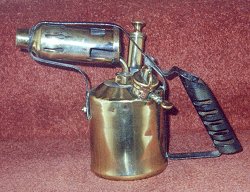 A paraffin blow lamp, marked with the Governor trade mark.
A paraffin blow lamp, marked with the Governor trade mark. |
The catalogue clearly reflects Shaw's as both
manufacturers and wholesalers. They say that they are exclusive
distributors for Governor, Lamb, Trojan, Onions & Co, E.C.Atkins,
Kelly Registered and Bridgeport. These are almost certainly their
own trade or band names, deriving from their own earlier business or
from the firms they had taken over. They also list numerous brands
for which they are wholesale distributors, including many of the
most famous. One of them is Britool. The names of Jenks seems to
have vanished. Indeed in later years one sees Britool
catalogues and advertisements and local people refer to the Bushbury
works as having been Britool's. |
Their last years in Wolverhampton are, at present, obscure. It
seems that at some time in the 1970s the firm was taken over by James
Neill Holdings plc of Sheffield. It is not known when
Shows/Britool moved out of Bushbury but none of the three companies is
now present here.

|
|

|
Return
to the list of companies |
|
See the
products from two catalogues |
|








 Edward D. Shaw
Edward D. Shaw Richard E. Shaw.
Richard E. Shaw.



 A paraffin blow lamp, marked with the Governor trade mark.
A paraffin blow lamp, marked with the Governor trade mark.